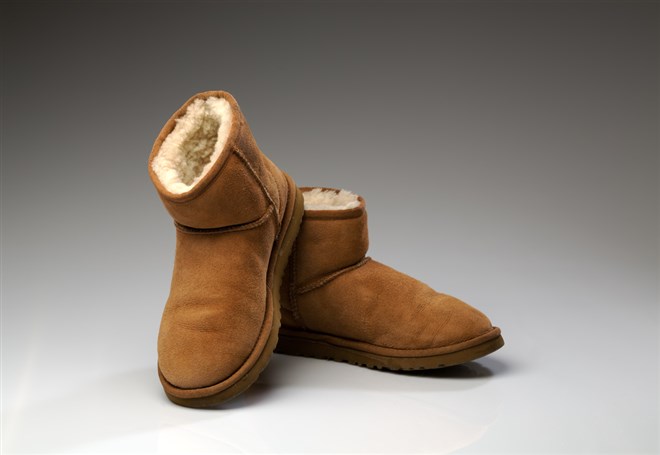 Deckers Outdoor NYSE: DECK
Deckers Outdoor NYSE: DECK reversed lower Friday after clearing a buy point above $444.48.
The shoemaker, perhaps best known for its Uggs and Teva brands, was founded in 1973 and went public in 1991.
In addition to those brands, Deckers' portfolio includes Hoka and Sanuk shoes.
The company has a long history of profitability and even managed earnings growth in 2020, despite an earnings decline in the first quarter and a loss in the second quarter.
Its most recent consolidation took the form of a flat base, with a 10% correction from peak to trough.
Deckers Outdoor rallied out of that base Thursday, hitting a session high of $447.72 on higher-than-average turnover. Friday, the stock opened higher and rallied to a new high of $451.49 before pulling back to close at $434.99.
That's in no way a busted breakout, as it's only 2% below its buy point. Friday's pullback also occurred in tandem with a broader market retreat, which definitely explains some of the action.
Nonetheless, it's worth watching to see if it retreats to something greater than 5% below its buy point. If it undercuts the previous structure low of $398.25 from September 8, that would re-set the base count, which could ultimately be constructive.
Of course, if the major indexes continue pulling back, as they have done this month, that would deepen the bases of many stocks or re-set base counts across the board.
Deckers has many characteristics of a mid-cap stock, in that it does not pay a dividend and it's still a fast grower. However, its market cap of $12 billion puts it at the lower end of what's commonly considered a large-cap.
Deckers Outdoor shares are up 34.52% in the past three months,53.41% year-to-date and 100.53% in the past year.
Over the past month, as Deckers has been forming its base, the return was just 1.30%.
Deckers Outdoor has increased its earnings in the past four quarters and sports a healthy return on equity of 30%. Its price/sales ratio of 4.52 may scare off some investors more accustomed to value stocks, although this company is positioning itself for growth mode. Higher price-to-sales ratios are more common in growth than value stocks.
Three-year growth rates are:
- Revenue 10.1%8
- Operating Income 31.33%
- Net Income 49.54%
- Diluted EPS 55.54%
On a quarterly basis, revenue growth accelerated from 2% a year ago to 78% most recently. In the quarter ended in June, Deckers revenue was $504.7 million. That was a sequential decline but a year-over-year increase.
Net sales across all brands grew year-over-year.
In its most recent quarter, net income was $1.71 per share, trouncing analysts' views of a $0.04 per share loss. The company has topped Wall Street forecasts in every quarter since February 2017.
According to MarketBeat data,
the consensus rating among analysts is a "buy," with a price target of $419.69, representing a 3.52% downside.
Deckers is next due to report on October 28, with analysts expecting earnings of $3.59 per share on revenue or $762.80 million.
On the earnings side, that would only be up a penny from the prior year, although it would mark a 22% revenue increase.
For the full year, Wall Street expects earnings of $15.70 per share, up 17%. Next year that's seen rising another 18% to $18.52 per share.
When it comes to additional profitability metrics, here's how Deckers' growth rates stack up over the past three years.
- Return on Assets 21.19 %
- Return on Equity 34.33%
- Return on Invested Capital 28.72%
- Net Margin 15.85%
By now, we've all become accustomed to companies citing supply chain, labor, or other constraints in their reports, and Deckers is no exception.
In its second-quarter earnings release, the company said it's "actively experiencing disruption and delays within its sourcing network related to Covid-19 outbreaks in various countries. The company is also experiencing capacity constraints and cost pressures related to container shortages and port congestion that are causing shipping delays and may lead to higher usage of air freight in future periods. The full effect of disruptions and delays are not yet known, but the company will continue to monitor the situation closely and is actively working to mitigate these pressures where possible."
In other words, Deckers is working to keep costs down, but it's anybody's guess as to how various constraints, delays, bottlenecks and shortages may affect operations going forward.
Before you consider Deckers Outdoor, you'll want to hear this.
MarketBeat keeps track of Wall Street's top-rated and best performing research analysts and the stocks they recommend to their clients on a daily basis. MarketBeat has identified the five stocks that top analysts are quietly whispering to their clients to buy now before the broader market catches on... and Deckers Outdoor wasn't on the list.
While Deckers Outdoor currently has a "Moderate Buy" rating among analysts, top-rated analysts believe these five stocks are better buys.
View The Five Stocks Here
Wondering where to start (or end) with AI stocks? These 10 simple stocks can help investors build long-term wealth as artificial intelligence continues to grow into the future.
Get This Free Report